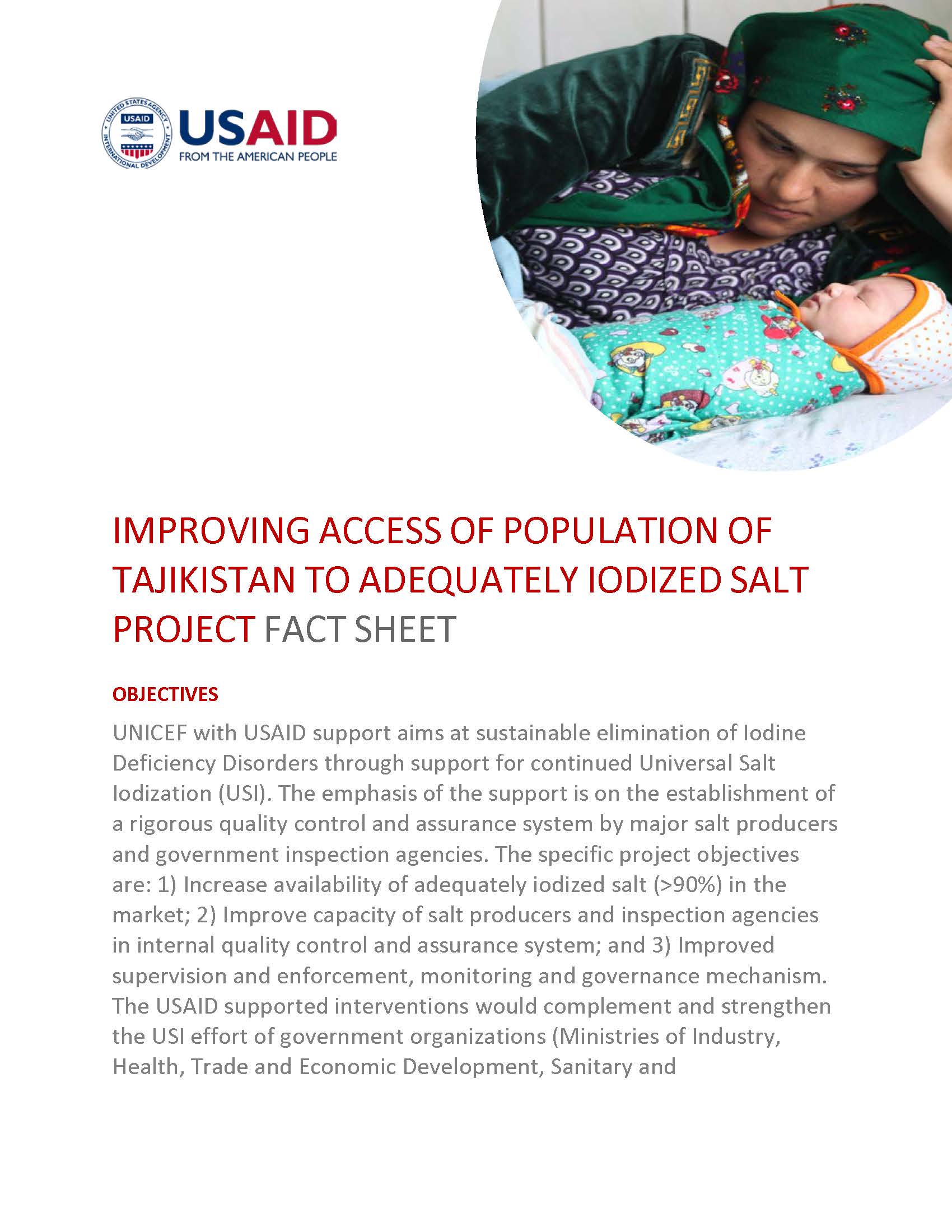Speeches Shim
OBJECTIVES
UNICEF with USAID support aims at sustainable elimination of Iodine Deficiency Disorders through support for continued Universal Salt Iodization (USI). The emphasis of the support is on the establishment of a rigorous quality control and assurance system by major salt producers and government inspection agencies. The specific project objectives are: 1) Increase availability of adequately iodized salt (>90%) in the market; 2) Improve capacity of salt producers and inspection agencies in internal quality control and assurance system; and 3) Improved supervision and enforcement, monitoring and governance mechanism. The USAID supported interventions would complement and strengthen the USI effort of government organizations (Ministries of Industry, Health, Trade and Economic Development, Sanitary and Epidemiological Surveillance, and Standard agency (Tajikstandard) and other agencies).
SITUATION AND SOLUTION
Iodine Deficiency Disorder is prevalent in Tajikistan, especially in the south and in mountainous areas. According to the 2016 Tajikistan Micronutrient Status Survey, the national median mean UIC (MUIC) for children 6-59 months and women of reproductive age (85.7 µg/L and 75 µg/L, respectively) was below the threshold value of 100 µg/L. For both groups, Sughd is the only region where the MUIC is above the threshold of 100.0 µg/l for adequate iodine level, and for both groups, iodine concentration had fallen substantially since 2009.
While the reasons for high levels of iodine deficiency continue to prevail and contributing factors require further investigation, efforts to promote iodine nutrition at national level needs to crucially continue as a priority. As such, the USAID fund aims to address the need for continued USI interventions with emphasis on establishment of a rigorous quality control and assurance system by major salt producers and government inspection agencies.
PROJECT ACCOMPLISHMENTS
-
UNICEF supported a comprehensive desk review of salt iodization/situation analysis focused on all aspects of salt production. The result of this analysis identified gaps and bottlenecks that prevent achievement of results for the successful implementation of the national salt iodization program in the country and contributed towards refinement of the UNICEF strategy around USI agenda in Tajikistan. This desk review also guided the development of effective advocacy tools to strengthen executive and legislative commitments to USI by the Government of Tajikistan.
-
UNICEF’s technical assistance to the salt producers and Textile Machine Factory resulted in production of locally salt processing and iodization plants with the capacity of 3 ton/hour. 6 out of 17 salt producers purchased local made equipment that is more effective compared to the old equipment they have, covering almost 30% of salt consumers in the country.
-
UNICEF supports the Food Corporation in conducting the capacity building training of laboratory technicians of 12 salt producers on internal monitoring of salt fortified with iodine.
-
UNICEF supported the Food Corporation to conduct the first meeting of the Regional Coalition in Khatlon. This meeting resulted in the development of terms of reference of the coalition and an action plan which stipulates, that the coalition will mobilize different stakeholders around USI scale-up and compliance, timely identification of bottlenecks, proposed solutions and facilitating the implementation of action plans.
-
As part of the project, progress was made in the establishment of an efficient system for systematic and quality data collection on iodized salt. In collaboration with inspection agencies, other state agencies and civil society, UNICEF facilitated the monitoring, collection of salt samples and titration. The purpose of this collaboration was to monitor the situation around availability of adequately iodized salt at the market, compared with the 2018 monitoring results. The titration method showed that compared to 2018 overall availability of the iodized salt had increased by 24%, and not iodized salt in the market decreased by 69% in 2019. The sample titration also revealed that by level of salt iodization in the market, the availability of the iodized salt (>25ppm) increased by 63%, not adequately iodized salt (<25-1ppm) decreased by 5% and not iodized salt (0ppm) decreased by 69% in 2019. Monitoring results clearly indicates that efforts to promote iodine nutrition at national level should be continued as a priority.
-
Regional workshops for Tojikstandard from Dushanbe, Districts of Republican Subordinate and Khtalon of the country were conducted. Over 90 staff of the national, regional and district offices of Tojikistandard. Due to the COVID-19 situation in the country, trainings for Tojikstandard staff in GBAO and Sughd will be conducted in July 2020.
PROJECT DURATION
May 2015 - June 2021
IMPLEMENTING AGENCY
UNICEF
PROJECT AREA
Tajikistan, National level
CONTACT
Malika Makhkambaeva, USAID/CA Tajikistan, Activity Manager
email: mmakhkambaeva@usaid.gov


Comment
Make a general inquiry or suggest an improvement.